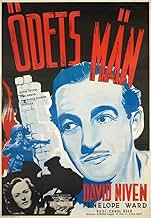IMDb RATING
6.9/10
2.3K
YOUR RATING
World War II drama that follows a group of British draftees, starting with their rigorous basic training, and ending with their deployment in North Africa.World War II drama that follows a group of British draftees, starting with their rigorous basic training, and ending with their deployment in North Africa.World War II drama that follows a group of British draftees, starting with their rigorous basic training, and ending with their deployment in North Africa.
- Awards
- 1 win
Hugh Burden
- Pte. Bill Parsons
- (as Hugh Burdon)
Jimmy Hanley
- Pte. Geoffrey Stainer
- (as Jimmie Hanley)
William Hartnell
- Sgt. Ned Fletcher
- (as Billy Hartnell)
A. Bromley Davenport
- Chelsea Pensioner
- (as Bromley Davenport)
Renée Asherson
- Marjorie Gillingham
- (as Renee Ascherson)
Storyline
Did you know
- TriviaIn the U.K., this was released on D-Day, June 6, 1944.
- GoofsFollowing some energetic army training, Private Bill Parsons is seen sitting on the grass at the top of a cliff, with his colleagues, exhausted. However, the action then cuts to him being helped up the cliff.
- Quotes
Pvt. Ted Brewer: Only one good man ever got into Parliament.
Pvt. Herbert Davenport: Oh really? Who?
Pvt. Ted Brewer: Bleedin' Guy Fawkes.
- Crazy creditsThe film ends with THE BEGINNING
- Alternate versionsThe version seen on American TV under the alternate title "The Immortal Battalion" has been re-edited and extensively cut (from 115 to 91 or 86 minutes) by Ed Fitz with an added preface and epilogue by war correspondent Quentin Reynolds.
- ConnectionsEdited into WW II Theater: The Way Ahead (2022)
- SoundtracksIf You Were the Only Girl (in the World)
(uncredited)
Written by Nat Ayer
Lyrics by Clifford Grey
Performed by Tessie O'Shea and soldiers
Featured review
Although it may appear simplistic to divide the work of great artists into three distinct periods, there can be no escaping the fact that this tidy and convenient way of classification actually works for the majority. In the case of the most significant British director of the immediate post World War II years, Carol Reed, the chronological view works surprisingly well. There is the fairly anonymous early period up to "The Way Ahead" of 1944, a glorious middle period from "Odd Man Out" to "Outcast of the Islands" - the subsequent "The Man Between" and "A Kid for Two Farthings", although less successful, belong to this period because of their stylistic affinity - and a third period where Reed reverted to anonymity possibly through the pressures of commercialism - how else to explain works as dull as "The Agony and the Ecstasy" and "The Running Man", which do not even look like Reed films. Certainly none of the other films in the first period compare with the sheer enjoyment and confidence of "The Way Ahead". Here the youngish director flexes his muscles, a little parochially perhaps, before taking centre stage with the great directors of that time, De Sica, Rossellini, Welles and Wyler. Technically the film is astonishingly assured. Every shot is lovingly composed with figures always formally balanced within each frame. The editing is nothing short of brilliant. It is only in retrospect and with the advantage of several showings that one realises that the excitement and immediacy of a scene such as the torpedoing of the troopship are entirely achieved by the skill of montage. In every sense "The Way Ahead" is immeasurably superior to the Lean/Coward naval counterpart "In Which We Serve" which parades class distinctions in a way that is positively nauseous. There is nothing patronising in Reed's presentation of a group of men drawn together by the accident of war. Although they come from different social backgrounds, Reed presents them as conditioned by their varied forms of employment rather than being pigeonholed by class. "The Way Ahead" is that very unusual thing, a completely upbeat war film. I suppose it had to be, given its date - 1944. With the scent of victory about to be achieved it had to be an optimistic morale booster. However it goes very much further than any other I know in presenting a completely sanitised war. Not a single character is killed let alone wounded - and this even after the ship carrying the bulk of the cast is blown to smithereens just seconds after the captain leaves. The film ends with the men attaching bayonets to rifles before marching forward into a desert attack. By now we are conditioned into thinking they will all survive although we will never have a way of really knowing. Not that it matters at this stage. So sit back, relax and enjoy as lovely a war as you are ever likely to experience.
- jandesimpson
- Aug 12, 2002
- Permalink
- How long is The Way Ahead?Powered by Alexa
Details
- Runtime1 hour 31 minutes
- Color
- Aspect ratio
- 1.37 : 1
Contribute to this page
Suggest an edit or add missing content






















